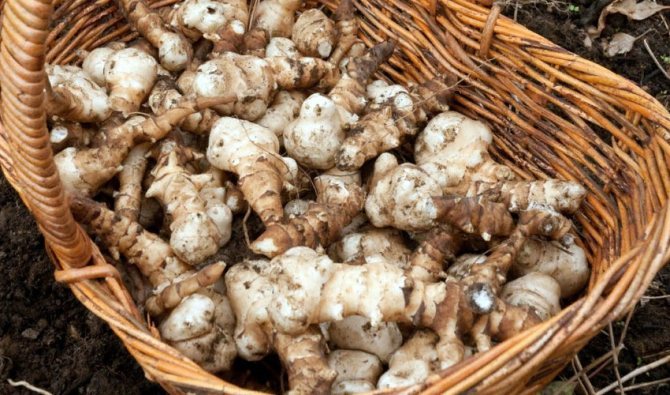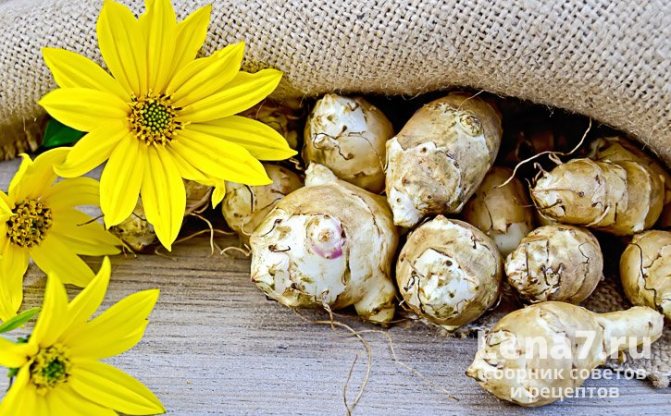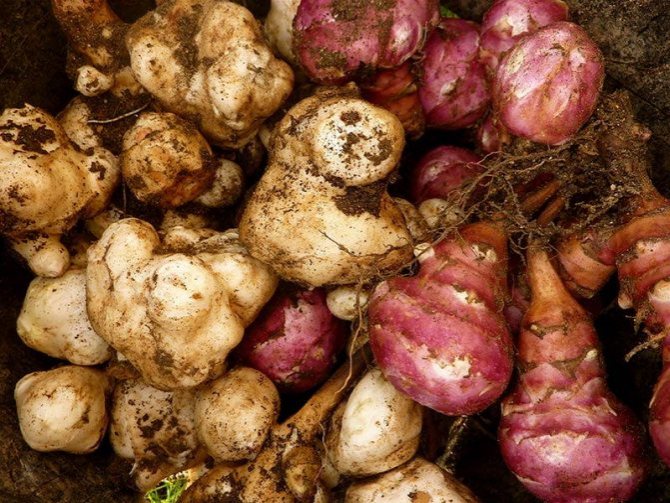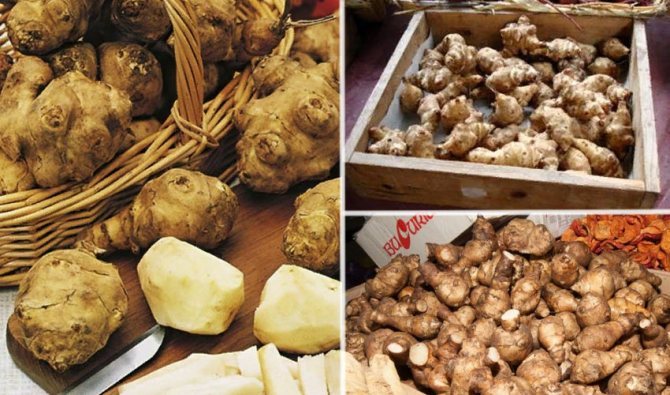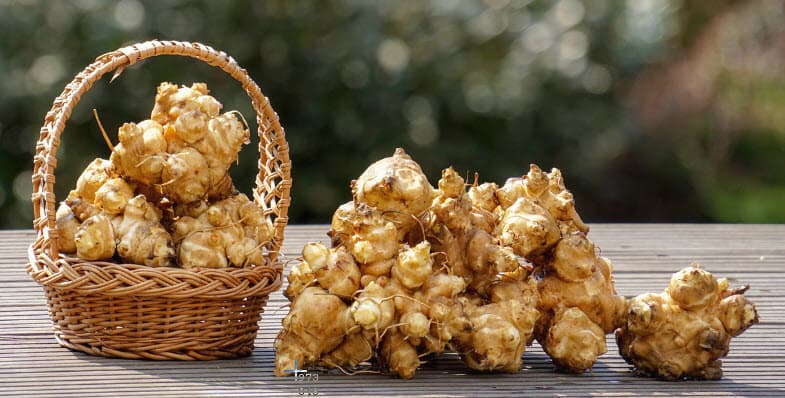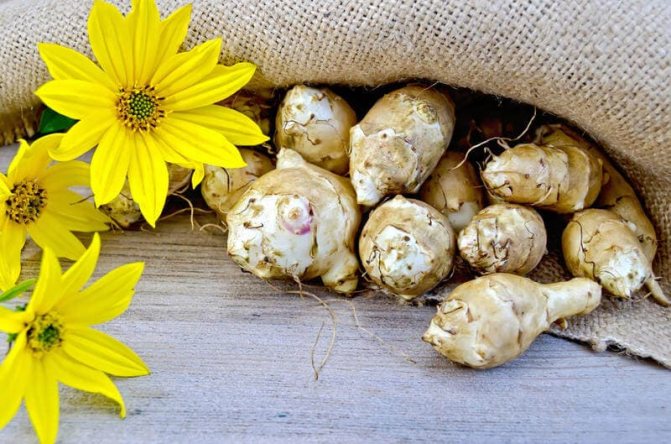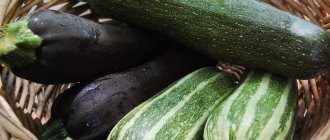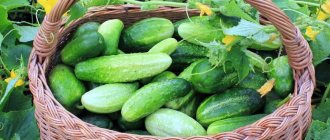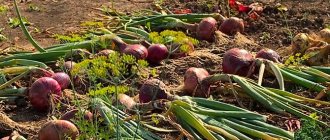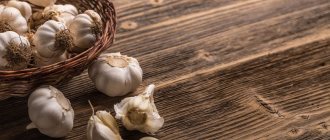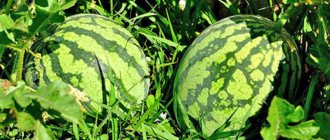Greetings, dear readers of the "Brownie Secrets" blog. Immediately after harvesting, the question arises: how to store Jerusalem artichoke, where to store Jerusalem artichoke, is it possible to keep Jerusalem artichoke all winter? These questions arise not only for novice gardeners, but also for experienced summer residents. Everyone knows the truth, it is important not only to grow the crop, but also to preserve it, so today I want to talk about 10 ways to store Jerusalem artichoke and what mistakes should be avoided when storing it.
When and how to properly dig up Jerusalem artichoke
The earthen pear is an unpretentious and frost-resistant plant that can even survive a temporary drought. Its tubers are tender, vulnerable due to too thin skin, which cannot protect against rotting and drying out. Fresh Jerusalem artichoke fruits can be eaten within 3-4 days after harvesting, then the root crop begins to deteriorate.
The further safety of the fruits depends on the time of collection. So, with the onset of autumn, you can remove part of the already ripe crop - it is not recommended to dig up the entire earthen pear. Fruits in the ground will be able to safely survive frosts down to -40 ° C without losing their properties. The storage of Jerusalem artichoke in the cellar or freezer is 1-3 months.
If there is no way to wait for spring, the roots should be harvested in mid-November, not earlier. At this time, the maximum of useful properties is noted in the composition of the product - the earlier the crop is harvested, the less benefit it will remain. It is important to choose the right time - there should be no slush and frost, which will complicate digging.
Two weeks before digging, you need to prepare the bushes: the shoots of the plant are cut off, leaving 15-20 cm above the ground, the roots are left to ripen - during this time all the nutrients will pass into the tubers.
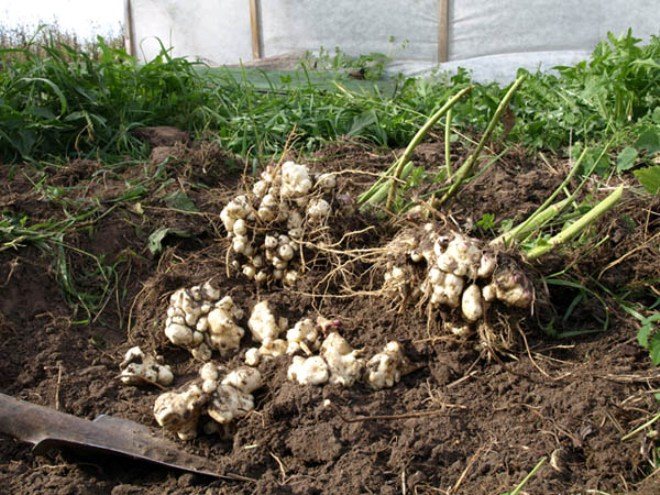
Contraindications
Jerusalem artichoke has no special contraindications, except for individual intolerance to the product. Therefore, it is introduced into the diet gradually, with small amounts, for example, from 1 teaspoon, in order to check the body's reaction.
The vegetable should be used with caution by those people who suffer from flatulence, as it increases gas production in the intestines. It is necessary to observe the measure in the amount of any food eaten.
From this video clip you will learn even more interesting facts about the benefits of Jerusalem artichoke and its dangers:
When to collect Jerusalem artichoke leaves for tea
It is best to harvest the leaves during flowering. To preserve the collection, the plucked parts of the plant must be thoroughly dried. A warm room with a low humidity level is suitable for this. It is important that the sun's rays do not fall on the leaves, destroying all the beneficial properties of the plant.
You can use an electric dryer. After processing, the leaves must be folded either in a cloth bag or in a glass jar, but the first option is preferable - in this case, the collection will "breathe" and will last for a longer time.
How to store Jerusalem artichoke at home
There are many ways of keeping it - everyone can choose the most suitable one, taking into account the storage time, the complexity of the preparatory work. Jerusalem artichoke tubers are tender, so do not peel off the ground too much and often shift them. If you accidentally damage the roots, they will start to deteriorate after a couple of days.
How to store in the cellar in winter
The advantage of storage in the basement is that this method does not require lengthy preparation.But the shelf life will be short. There are several options:
- Tubers, without shaking off the ground, are placed in wooden or plastic containers, covered with peat or dry sawdust on top.
- The roots are pre-lubricated with clay, allowed to dry, put in a bag and carefully tied so that air does not penetrate.
Sometimes you need to check that there are no signs of rot on the Jerusalem artichoke. The temperature in the basement should not be higher than + 5 ° С. The shelf life in this case is about a month.
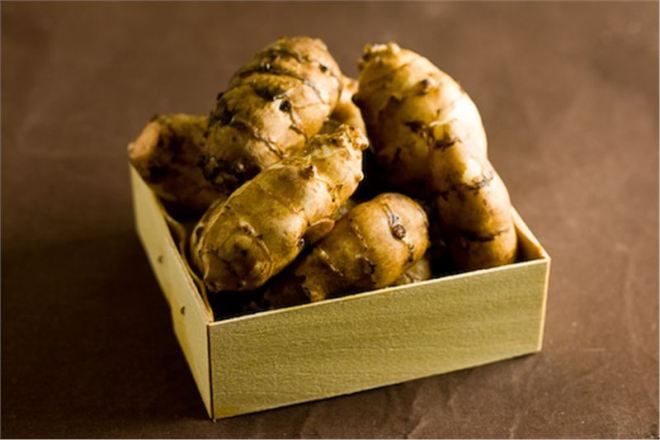

Is it possible to freeze at home in the freezer
Freezing is one of the easiest ways to keep Jerusalem artichoke in your apartment for the winter. Before sending the Jerusalem artichoke to the freezer, the roots are washed, peeled, cut into cubes and placed in a bag or in a special container for food. Freezing will preserve the beneficial properties of the fruit for 3 months.
To defrost the food, you need to put the cubes in cold water. If you immediately subject the product to heat treatment, Jerusalem artichoke can turn into porridge.
Some people store Jerusalem artichoke in the refrigerator for no more than 3 weeks. You need to carefully peel the fruits, put them in hermetically sealed plastic containers.
How to store Jerusalem artichoke on the balcony
You can also store Jerusalem artichoke at home on a glazed balcony in winter - this is a good place for root crops. Even if the fruits freeze a little, they will retain their beneficial properties.
You need to take a box, pour sawdust or wet sand into it, put Jerusalem artichoke there. The shelf life in this form is at least 2 months.
There is one important point - you need to send root crops for storage immediately after collection. When exposed to high temperatures, the sun earthen pear will quickly deteriorate.
Drying
The tubers can be dried. There are several ways to carry out work at home:
- On air. Root vegetables are washed, cut into slices, laid out on a tray, left in the shade for 2-3 days. Cover the roots with gauze to avoid damage from flies.
- In the oven. The tubers are boiled in advance, 1 tsp is added to a saucepan with salted water. soda, put chopped root vegetables there. After 10 minutes, they are taken out, laid out on a baking sheet, sent to the oven and dried for 3 hours at a temperature of + 50 ° C. Mix the contents regularly.
- In an electric dryer. This equipment will allow you to conveniently dry any fruit. Root crops are washed, cleaned, cut, put in the dryer for 4 hours.
Basement or cellar
If you are lucky enough to be the owner of a cellar or basement, then the problem of how to store Jerusalem artichoke is not worth it.
Here, in general, there are a lot of options, each of them is easy, requires little cost and effort:
- Bury it in a container with sand, where carrots are usually stored.
- A whole Jerusalem artichoke root with tubers is dug out without breaking. They are placed directly with the ground in a container of suitable size. Placed on the floor.
- No containers? Ordinary boxes will do. You just need to pour moss, peat or sawdust on top.
- Lubricate the roots with a clay mash, dry them. Carefully lay out in thick plastic bags. Tied up, trying to leave as little air as possible.
The most important thing is to leave the hemp of the plant 10 cm long. This way the roots retain more nutrients.
If there is no cellar or basement, then a cool pantry or an insulated balcony will do.
The optimum temperature for this storage method is + 2-4 ° C. If possible, you need to regularly inspect the bookmarks in order to notice the onset of the putrefactive process in time. Jerusalem artichoke is a succulent plant, it can also deteriorate.
Advice. Beets and potatoes are bad neighbors for root crops. It is recommended to place them further away from each other.
- Jerusalem artichoke should not be rubbed to remove dirt. It can only be shaken off. The same goes for drying.Let it dry naturally. Even the softest rags scrape the skin.
- If there is no way to somehow keep the earthen pear fresh, then there are a great many recipes for blanks. After heat treatment, some of the substances are lost, but inulin (namely, because of it the plant is so valued) will not go anywhere.
- The tubers are stored in the refrigerator on the vegetable shelf for only 4 weeks.
- If a natural storage method is chosen, it is recommended to cut off all the tops. Leave only hemp 12-15 cm high.
- It is advisable to use an earthen pear before March-April. With the onset of heat, the tubers give buds, growth begins. For food purposes, such roots are no longer suitable.
- Dried wedges or straws are best kept in glass jars with a tight lid.
- People suffering from flatulence can stop worrying about the safety of Jerusalem artichoke. They simply cannot.
- The humidity of the environment during storage after excavation must be at least 85%.
- For the trenching method, you can use plastic flower pots or buckets. So it will be more convenient to get an earthen pear in winter. Gently pulled the handle and you're done!
- Do not store Jerusalem artichoke directly on the concrete floor of the cellar. Cement perfectly absorbs moisture, so the tubers will dry out quickly.
- Inspect each tuber carefully before laying. First of all, you need to use damaged or scratched ones.
Jerusalem artichoke blank recipes
From Jerusalem artichoke, you can make numerous preparations, pleasant to taste and useful, if properly prepared, all useful substances will be preserved in an earthen pear.
You can make a winter salad from Jerusalem artichoke, for the preparation of which you need:
- 2 kg of root vegetables;
- 4 onions;
- 5 bell peppers;
- 1 small carrot;
- Bay leaf.
- The products are washed, cut into strips.
- Make a marinade from 2 liters of water, 100 ml of vinegar, 100 g of salt, 1 tsp. honey, insist for an hour.
- They put the food in glass jars, pour it with marinade, sterilize it for 15 minutes, roll it up.
Another option is making jam. To do this, take Jerusalem artichoke, pumpkin in equal proportions, add sugar and lemon to taste, mix and leave to infuse. During this time, you need to prepare the jars: they are thoroughly washed, sterilized. The jam is poured into containers and rolled up.
You can make jam from Jerusalem artichoke. The preparation is as follows:
- Wash with 1 kg of plums, separate from the seeds, put in an aluminum container.
- Add 2 kg of finely chopped earthen pear, 200 g of sugar, 200 ml of water.
- Boil for 10 minutes, rub through a sieve, boil again for 10 minutes.
- Poured into jars and screwed them up.
This jam is suitable as a filling for pies, it can be served with tea.
It is also recommended to make a delicious pickled Jerusalem artichoke - this is an excellent appetizer, which is not worse in quality than pickled cucumbers or tomatoes.
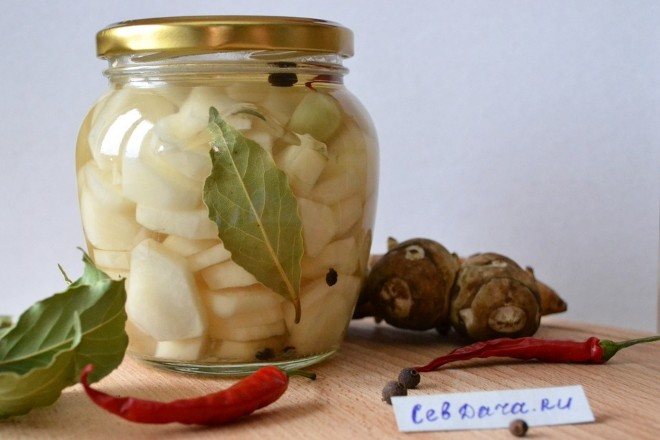

- The tubers are washed, chopped, placed in a saucepan.
- Pour brine from 1 liter of water and 50 g of salt.
- Leave under oppression at room temperature.
- After 10 days, you can transfer the pickles to the refrigerator.
Several options for healthy drinks can be made from the leaves of the plant:
- Tea. Take 1 tsp. leaves, put in a thermos, pour 0.5 liters of boiling water and insist for 3 hours. Take the infusion half an hour before meals 3 times a day.
- Broth. The leaves are crushed as much as possible, filled with water, put the mixture on the stove and brought to a boil. The main thing is that the mixture does not boil and boil. The liquid is filtered, taken 2 times a day, 20 minutes before meals.
Unusual recipe - Jerusalem artichoke coffee. This is a healthy drink that will strengthen the body's defenses, improve metabolism, and cope with chronic fatigue.It is also recommended to take it as a preventive measure against diseases of the cardiovascular system, diabetes mellitus.
- Root crops are washed, cleaned, finely chopped, dried for several days in the open air.
- Dry in the oven until the roots darken.
- Fry in a pan before use.
- Fall asleep 1 tsp. raw materials in a cup, pour boiling water.
The drink can be used as a base for desserts. You just need to mix it with cream, banana slices, 1 tbsp. ice cream and ice cubes, beat in a blender and pour into portions.
Beneficial features
As soon as people liked Jerusalem artichoke, they began to notice the benefits that it brings. Today, the list of useful properties of an earthen pear is impressive. Here are the most important ones:
- excretion of bile and urine;
- calming the central nervous system;
- cleansing from harmful elements;
- restoration of the liver;
- elimination of inflammation;
- strengthening the immune system;
- suppression of bacteria and viruses;
- neutralization of the action of harmful elements in the body;
- promoting better blood clotting;
- preventing the development of tumors;
- stopping diarrhea;
- wound healing;
- cell restoration;
- prevention of diabetes and atherosclerosis;
- pain relief.


Proteins in tubers affect the hormonal system, muscle growth, are involved in strengthening immunity, insulin synthesis. They contain 16 amino acids, several of which the human body does not produce.
Ash, Fitted in an earthen pear, it has an anti-inflammatory, wound healing, hemostatic effect, and also helps dissolve blood clots.
Potassium regulates metabolism, normalizes water balance, relieves edema, strengthens the heart, blood vessels, normalizes blood pressure, relieves spasms.
Calcium, in addition to participating in the work of the cardiovascular system, it cleans the body of harmful elements.
Magnesium strengthens bones, improves the functioning of the central nervous system.
Sodium normalizes water-salt and maintains acid-base balance.
Iron - an important element in hematopoiesis, the functioning of the immune system.
Phosphorus provides energy metabolism, stimulates mental and physical activity, has a beneficial effect on the functioning of the kidneys and heart.
Thus, Jerusalem artichoke is advised to be consumed by diabetics, hypertensive patients, people suffering from kidney diseases, disorders of the digestive system, sick with acute respiratory viral infections, having problems with the heart and blood vessels, as well as those who want to cleanse the body of harmful elements and restore the microflora in the intestines.
How to choose Jerusalem artichoke
Before we talk about storing Jerusalem artichoke, let's figure out how to choose the right root vegetable. Please note the following when purchasing:
- Jerusalem artichoke fruits come in various shapes and sizes. The color of the tubers can vary from yellowish and brown to red;
- the tubers should be firm and firm to the touch. Don't buy soft and lethargic fruits;
- inspect the skin of the root vegetable. If the surface has roughness and build-up, this is normal. But the wrinkled appearance and the emerging spots on the peel indicate a poor-quality product;
- Jerusalem artichoke has a pleasant and light earthy smell.
Jerusalem artichoke: when to harvest?
Jerusalem artichoke is an extremely unpretentious, fertile and frost-resistant plant. It is cultivated in different latitudes. The root crop tolerates temporary drought and is considered a hardy crop.
Jerusalem artichoke's vulnerability lies in its very thin skin, which does not coarse and cannot protect the tubers from drying out and decay.
A fresh root vegetable can be eaten for several days after harvest, then it wilts. That is why it is best to store Jerusalem artichoke in the ground in winter.
The crop is harvested in the fall before the onset of frost or in early spring, while the tubers have not yet begun to germinate.Spring picking of root crops is preferable to autumn, since all vitamins are completely preserved in the tubers. Dig it up as needed, since Jerusalem artichoke is stored better in the soil and tolerates frosts down to -40 ℃.
Taking into account the peculiarities of Jerusalem artichoke, residents of private houses practice the following storage method: a shallow trench is prepared for the harvested crop, the bottom of which is covered with spruce branches. The dug tubers are placed in plastic flower pots and placed in a trench, laid on top with a layer of snow or sand, then with an insulating material (hay, peat) and a sheet of roofing material. With this method, the root crop will lie until spring, preserve useful properties, will not fade or rot. Due to the frost resistance of Jerusalem artichoke, many gardeners store it in pits and piles.
How to store Jerusalem artichoke at home
Despite all the nuances, storage of Jerusalem artichoke at home is quite acceptable. Let's consider several ways.
In the refrigerator in a plastic or paper bag. The most affordable and efficient way. The tubers are washed, dried, placed in bags or plastic containers and stored in the vegetable compartment. The shelf life is 2-3 weeks. Jerusalem artichoke will fade without a package in a few days. If you do not plan on long-term storage, you can simply wrap the tubers in a damp cloth and put them in the refrigerator.
The temperature for storing Jerusalem artichoke should be from -5 to +4 ℃, and the humidity should be 85%. At higher rates, tubers begin to sprout, but Jerusalem artichoke is not afraid of frost - frozen tubers do not lose their taste and useful qualities.
In the freezer. Jerusalem artichoke can be kept fresh for up to 3 months if it is frozen. The peeled tubers are cut into pieces or grated, placed in a plastic container with a lid or plastic bags and stored in the freezer.
On the balcony. Jerusalem artichoke is placed in boxes or bags with sawdust, wet sand or peat. It is important to avoid exposure to sunlight and temperature rise of more than +4. The tubers will be able to retain their properties for 2-4 months.
Only freshly harvested crops are laid for long-term storage, so you should not expect much from store-bought Jerusalem artichoke.
In a cellar or basement. Jerusalem artichoke is laid out in wooden boxes, sprinkled with sand, earth, peat or moss, and covered with plywood sheets on top. It is better not to clean the tubers of soil before storing them. Jerusalem artichoke can be stored with carrots. But beets and potatoes are far from the best "neighbors" for him.
To preserve Jerusalem artichoke, it is often treated with paraffin: the tubers are immersed in melted warm paraffin, and after it hardens, they are sent to the basement for storage.
Dried. The dried root vegetable retains all the beneficial properties. The tubers are washed, cut into plates and dried in the open air for 4-5 days. You can use an electric dryer (following its instructions) or an oven (see below).
Jerusalem artichoke is not dried under the sun, but only in the shade. The product is stored in sealed paper bags or cloth bags, in a cool and dry place for 12-18 months. It is also acceptable to keep it in the refrigerator in a tightly closed glass jar.
You can dry the root vegetable in the oven, but you must first process it. In salted water with the addition of baking soda (8 g of baking soda per 1 liter of water), Jerusalem artichoke is blanched for 10-15 minutes, then cut and dried in the oven at a temperature of 50-60 ℃ for about 3 hours.
Jerusalem artichoke tubers are not stored at room temperature - they quickly wither and deteriorate. If Jerusalem artichoke has been in the open air and light for a long time, it does not need to be eaten.
From Jerusalem artichoke syrups, jams are prepared, flour is made.Canning is also a great way to store this medicinal root vegetable. And of course, it is baked or eaten raw.
Winter storage features
Tuber preparation
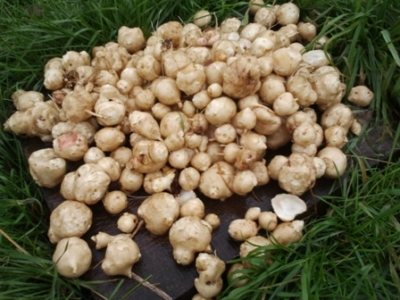

Before storage, the tubers are well dried, excess soil is removed. This must be done very carefully so as not to damage the thin skin. Jerusalem artichoke does not like warmth and sun. It tolerates even severe frosts better than a slight rise in temperature.
Moisture is also very important - the fruit dries out quickly. Favorable conditions for are considered: temperature regime 1 ... 4 ° C and humidity not more than 85%.
Subtleties
- For planting and for eating. Until spring, for planting, you need to keep healthy large tubers, without signs of disease and not damaged by pests. By the spring, the first shoots should appear on them. It is not necessary to store Jerusalem artichoke for planting in spring. It can be planted in the fall; it is even easier not to dig it out all, but leave some of the roots. In the spring they will sprout on their own. For human consumption, the root vegetable is stored in many different ways. Choose at your own discretion.
- Depending on the season. At any time of the year, regardless of the chosen method, fresh storage of Jerusalem artichoke will be short-lived, about two months. Therefore, it is recommended not to harvest the entire crop at once, but to leave a part until spring. The ground will thaw, and you will have another portion of this healthy vegetable.
- Tubers, leaves and flowers of a vegetable. This wonderful plant has useful not only tubers, but also leaves and flowers. Dried, they are stored safely throughout the winter, unlike tubers. First, before flowering, the leaves are harvested. During this period, the concentration of useful components in them is maximum. All greens are dried in a dry dark place, stored in a cloth bag. In winter, it can be used for medicinal, cosmetic purposes, or simply brewed like tea.
Step-by-step instruction
At home
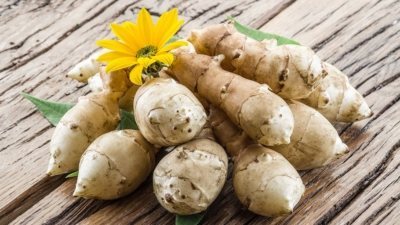

You can store Jerusalem artichoke in an apartment or house in winter, but for this you need to find suitable conditions.
Based on scientific research, we can say that if you leave Jerusalem artichoke in a room with an air temperature of 17 ... 22 ° C, then within 10 days the mass of tubers will decrease by 7%, and within 20 days - by 14%. Therefore, it is better to use one of the methods below.
In a refrigerator
+ In the refrigerator, Jerusalem artichoke will always be at your fingertips.
– Small shelf life.
Duration of storage. The vegetable will remain fresh for no more than 2-3 weeks.
Earthen pear - you can eat!
Jerusalem artichoke owes its origin to North America, and the name - to the local Jerusalem artichoke tribe, which cultivated it for a long time and successfully. At the beginning of the 17th century, the French traveler Samuel Champlain introduced this vegetable to Western Europe, and only by the middle of the 18th century it began to be cultivated in Russia. However, it has not received widespread popularity and distribution among farmers (and even amateur gardeners) to this day.
But it is completely in vain. Both the tubers and the leaves of the plant are very rich in iron and silicon, folic acid, and for people with diabetes it can be just a godsend... The inulin found in the roots can completely replace artificial sweeteners for diabetics. Earthen pear, Polish walnut, Peruvian aster - these are all synonyms of Jerusalem artichoke.
The advantages of cultivation on an industrial scale are considered its excellent frost resistance (up to minus 40 ° C), drought resistance, adaptability to almost any type of soil, except for salt marshes. The aboveground part is an excellent food for animals, and a wide variety of preparations for the winter can be made directly from Jerusalem artichoke.
How to prepare Jerusalem artichoke for the winter - recipes for canning and freezing
Fresh, thoroughly washed and dried earthen pear tubers are stored in the cellar for no more than a month, and then very quickly lose moisture.The best option in this case would be to freeze Jerusalem artichoke in the freezer. Dry roots are packed in separate plastic bags and frozen for the winter. Then, before use, they are placed in a container with cold water for thawing.
Before harvesting, the selected roots are peeled and put in a container with water. This will make them even juicier.
To prepare a salad, take 1 kg of Jerusalem artichoke, 0.5 kg each of onions and carrots. We clean and cut them. Then we prepare the marinade: add 40 g of salt, black pepper, 50 g of table vinegar to a liter of water. We boil for 5-7 minutes. Vinegar can be replaced with one lemon, cut into slices with skin. Pour the vegetables laid out in sterilized jars with a boiling mixture, pasteurize for 15–20 minutes at a temperature of 90 ° C and close them tightly with lids. To add a spicy flavor to the dish, you can add 2 tbsp to the marinade. spoons of honey.
Also, the salad can be prepared without the marinade, but it will take a little more time for the preparatory work. Earthen pear, onion, carrot in the same proportions are finely chopped or grated on a coarse grater, salted, lemon grated with zest is added to the mixture and left for some time (about 12 hours) until the juice is released. Then they are laid out in containers and canned. If you want to add spice, you can add one hot peppercorn to the mixture.
Delicious preparations and unusual recipes
Pickled Jerusalem artichoke will also be tasty. In order to preserve the iron and potassium in the vegetable as much as possible, it is carefully washed, but the skin is not cut off. It does not affect the taste in any way, only the color of the dish itself may not be a very beautiful grayish shade. Cut the tubers into thin slices and put them in jars, enamel or ceramic containers. Fill with saline - 40 g of salt will be needed per liter of water. We cover the containers with lids and leave in a cool place until the end of fermentation. After about 2 weeks, pickled Jerusalem artichoke can be used as a side dish for fish dishes, added to vinaigrette and salads.
Jerusalem artichoke jam is a very unusual dessert, the recipe for which is quite simple. You will need:
- washed and peeled tubers of earthen pear - 1 kg;
- peeled pumpkin - 1 kg;
- lemon - 1 pc.;
- sugar - 250 g
Mix the chopped ingredients and wait for the juice to stand out. Then bring the resulting mass to a boil. The future dessert should be cooked for no more than 5 minutes, after which we pour the jam directly from the stove into pre-prepared jars. Next is the standard seaming procedure for metal caps. The dessert should cool in a warm place. In winter, it is very tasty and useful to use such jam for filling in yeast pies. If you still have pumpkin in the process, cook pumpkin compote - another representative of healthy cuisine!
If you like dried fruits, then you can cook them from an earthen pear. How to dry Jerusalem artichoke properly? You can put thinly sliced peeled vegetable plates in the oven on a baking sheet and leave for several hours at a temperature of 70 ° C. Or put the sliced pieces near the heating radiators in the room for several days. Then put them in linen bags and use with tea or coffee.
Drying methods
In dried Jerusalem artichoke, almost all the beneficial properties inherent in the root crop are preserved. You can prepare it in several ways - in the oven, in an electric dryer, or naturally, in the fresh air.
On air
Air drying of root crops is one of the most affordable and popular methods to preserve the main properties. This procedure should be carried out within 5-7 days, which should be sunny and clear. Cloudy weather is not recommended for drying Jerusalem artichoke in the open air, since the process will be significantly delayed, and the roots themselves risk being damaged by midges and flies.
Lay out whole or chopped Jerusalem artichoke on parchment paper and expose to the open air. The product can be considered completely ready as soon as all moisture has evaporated from it.
In the oven
The drying process in the oven is faster and can be applied at any time of the year, regardless of weather conditions. In this case, it is necessary:
- Place special baking paper on clean baking sheets.
- Cut the Jerusalem artichoke tubers into thin slices and place them on the covered baking sheets so that they do not come into contact with each other.
- Set the oven temperature at +50 degrees and hold for three hours. During this period, some of the water will evaporate from the cut tubers.
- Leave the Jerusalem artichoke slices alone for one day so that they can cool naturally.
- Send the chopped root vegetables back to the oven, where they are finally cooked at 60-degree temperature.
The result is thin and crispy, very tasty Jerusalem artichoke slices, which fully retain their useful properties.
In an electric dryer
The electric dryer is very convenient for preparing such workpieces, since it is equipped with several sections and a function for adjusting the temperature level. On the dashboard, you can preset all the necessary parameters. The device will notify the readiness of the product with a special signal.


